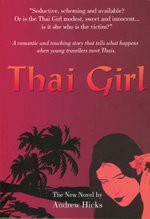

[PROKOGUE
I am in an internet cade\\fe in Sanghka. There are some typing errors as the letters on the keyboard are all worn out and I cannot tuch type.. I came in here to do this post ecause my own ToT IPStar internet at home is too slow to download pictures. I have sufcceeded in posting the pics but as the wording on the computer is all in Thai, I have committed an illeal action and the flashcard on which I'd put the text of this blog has become corrupted. So I've lost the text. I shall go home and try and post the text from there. (If so it will have taken a weej of trying to get this to you.)
Or I could just commit hari kiri... it'd save a lot of hassle!
Two hours later... back home and after five tries I've managed to post the text and have marginally survived!]
"PRESENT TENSE... FUTURE PERFECT!"
Staying married is never easy at the best of times as everyone knows. Major cultural differences are an added problem but language can sometimes be the biggest one. How can you understand each other unless you share a near perfect knowledge of a common language.
My skill in Thai is limited so Cat has to do the hard work of bridging the linguistic gulf between us and she does it pretty well. In fact she has far outstripped her English teachers at the village school and they are hugely impressed by her fluency.
Misunderstandings between us because of language happen rarely but when they do it’s usually because verb tenses in English are so horribly complex. We have twelve tenses with labyrinthine rules that are readily broken which overwhelms most Thais as the Thai language has no tenses at all.
‘He has a nice car.’ Present tense. ‘He has bought a new car.’ Perfect tense.
‘Will he have bought a new car?’ That’s ‘future perfect’… if I remember correctly!
‘Mama go market,’ says Cat to me as she shoots out of the door.
‘You mean she’s going to go or she’s gone?’ I reply, trying to be sure as I run after her.
‘I tell you already!’ says Cat. ‘You farang, you talk too mutt!’
I know e farang always talk too much but while the present’s tense, if I could perfect my Thai or Cat her English, the future could be almost perfect.
If Cat has transcended her teachers despite their Masters degrees in English, why is the general standard of English so low in Thailand?
I once met a senior teacher and the only thing he managed to say, when proffering a chair was, ‘Siddow pree’. From then on he could say nothing and Cat had to act as our interpreter.
Peter tells me of a local headteacher who got funds to build a library and so built himself a private office. On the outside of the door is a sliding notice which he changes as he goes in and out. Despite protests from his colleagues, it says, ‘Is’ and ‘No Is’!
At another school we visited, nicely painted as a permanent English language display hanging along the passage way are the words ‘postman’, ‘foot’, ‘brather’ and ‘annona’.
I’ve done a fair bit of voluntary teaching and helped many a child with their homework round here in the village and they do seem to find English terribly difficult. I accept that they just wanted me to do their homework for them and weren’t interested in learning anything… that’s normal. But what’s less explicable is that the exercises set for the homework were always several years ahead of the actual achievement level of the children.
I’m sure I wasn’t coaching dummies… they were simply floundering in water that had been made much too deep for them. No doubt the teacher was storming ahead through the book at a set pace and couldn’t slow down as this would be an admission of failure to achieve. As a result the kids were floundering and dispirited.
Yes, English with its many linguistic derivations, Greek, Latin, Germanic and so on is immensely rich and complex and it’s also liberally garnished with idiotic modern idiom which makes it even more difficult.
Thus a ‘makeover’ is a made up word about makeup. We chop down a tree before we chop it up. When the alarm comes on we say it goes off. Then we wind up a clock to get it started but wind up a company to close it down. The confusions are never ending.
Even worse, the Thais have insuperable problems with pronunciation. ‘Rice’, ‘house’, ‘horse’, ‘fish’ and ‘snake’ are impossible for many of them. ‘The sa-nake wen-t into the how to ea-t rai.’
Chinese speakers too have similar problems with sound clusters and word endings but when I went there as one of the first foreign visitors in 1978 shortly after the Cultural Revolution our guides spoke ponderous but fluent English. They had never met a foreigner of any sort before and had learned solely from books and listening to radio broadcasts.
I’m also intrigued that in Cambodia the level of English encountered in the street is far better than in Thailand. The little girls selling postcards at Angkor Wat chat happily and are totally at ease in the English language. No, they didn’t learn it at school… they’re too poor to go to school, they said. Talking about this to a Japanese man I met, he then spoke to one of them in Japanese and she responded fluently.
The more needy you are, the cleverer you have to be? No I don’t think that explains it. Plenty of Thais desperately need a leg-up into a better job through better English.
As another example, in Phnom Penh the motorbike taxi driver who picked me up at the frenetic central market when I got back from Kampot elicited my whole life history from me as we rushed through the traffic jams back to Maria’s place. This gave him the opportunity to offer his services for the rest of the day but he was gracious and friendly when I declined.
In Malaysia or Singapore, even far up country in Nigeria, people speak good English. Thailand did well to avoid being colonized but now has a lot of ground to make up. Even so, Cambodia was colonized by the French and Indonesia by the Dutch, yet the standard of English seems to be higher there, despite their economies being less developed.
So what’s the big problem in Thailand?
Though good English opens the door to many a job, is there a cultural resistance to absorbing something so foreign? Could it be that English is an Everest too high? It’s easy enough to learn a few words but is functional English just too difficult?
Thai kids often have an unspoken portfolio of words but it seems to be limited to ‘door’, ‘table’, ‘book’, ‘aeroplane’, and so on. It’s never ‘a book’, ‘an aeroplane’ or ‘the tables’. Thai has no articles or plurals and they just don’t seem to get the idea.
In my teaching I've often tried drilling standard questions.
‘What’s this?’ Answer… ‘It’s a car.’ Over weeks of repetition, this simple response still seemed so desperately difficult. ‘What colour is it?’ ‘It’s a red,’ they’d reply.
And speaking is just so embarrassing! Many Thais even in upmarket shops seem paralysed by shyness at the prospect of actually uttering something in English to a foreigner.
Until I hit sixty and had free eye tests in England, I used to go into ‘Beautiful Optical’, a big opticians in Sukhumvit, the tourist epicenter of Bangkok. It looks as if they haven’t had a customer since I was there last year and they rush to throw open the door as I approach. Milky white beauty queens all of them, they surround me as they edge me towards the desk, wai-ing humbly and smiling anxiously.
I produce my broken glasses.
‘I’m from Surin and an elephant trod on my specs,’ I say jovially. They all nod in solemn incomprehension.
One tests my eyes. Like the driving test it takes about a minute. Another helps me choose a frame. Yet another sits me down and measures my nose. Then they sit me on a couch and ply me with salty orange juice and haggle hard, decimating the price of the glasses, knocking off percentages with a small calculator until at last I smile. I wasn’t haggling anyway but the price has been brutally cut without a word being spoken.
They’re sweet and embarrassed as if I’m the only farang who’s ever come their way. The deal done, they all try to open the door for me and wai at the same time. It’s raining as I plunge outside into the heat and I nearly slip and break my new glasses on the slippery tiles of the sidewalk.
In many places where you might expect a reasonable level of English, you’ll often be disappointed. I use a branch of a major bank in Sukhumvit nearby and nobody seems to speak a word of English. Instead they huddle in a corner and look down uncomfortably whenever a farang walks in. The other day the ATM outside wouldn’t do a money transfer for me and I had to go in to ask for their help. The girl was all smiles and came out and wordlessly explained what I didn’t understand. The ATM screen which says, ‘Insert number of bill’ was supposed to mean, ‘Enter the amount to be transferred’. Couldn’t a major bank do better than that?
In the sixties, Japanese English was a joke but then they got their act together so as to sell more of their stuff. Thailand’s commercial world hasn’t got there yet though. Outside another big opticians shop I saw a big slogan reading, ‘Living in a vibrant world where every eyeful stimulates’. Thai Airways recently ran a campaign saying, ‘Buy One, Get One’. The firecracker I bought said, ‘Warning… shoots flaming balls with reports’.
I sit in the visa office in Bangkok under a sign that reads, ‘The visa extension process paid only fees, do not believe anyone.’
I have to produce to them a medical report which certifies that I am ‘free of dangerous step of tuberculosis’ and of ‘filariasis (step that causes disgust to society)’, and that I am ‘free of any defect’. Furthermore their leaflet says, ‘A foreigner who…wishes to re-enter Thailand during the validity period of his/her existing approval will expire immediately.’ Sounds worrying!
The menu in a smart restaurant offers ‘fried special wild bear in spicy taste’ and ‘soured telly vermicelli with thaw’. Yes, I love the menus.
At the Temple of Dawn in Bangkok I saw a big notice which said, ‘Do not dangle any doll’, and at the Pha Thaem National Park at the top of the unfenced cliff was a cryptic notice reading, ‘No Poke’. No, it’s not fair to poke fun, especially when my Thai language skills are even worse, but still I do wonder why!
The leaflet for the elephant fair in Surin told us that the show begins ‘with the Surin deva on the back of charming elephant evacuating from the clouds’. Perhaps this was to do with the fear of losing face. While someone was clever enough to have a good shot at writing a brochure, to get it looked at by one of the many native speaking English teachers in the town could have been humiliating. Instead it wasn’t checked and a greater public embarrassment resulted.
Governments have been well aware of the extent of the problem and that the obvious answer is better English teaching in schools. There’s often talk of recruiting more native speaking teachers with better qualifications, but then they’re reluctant to pay them properly. Salaries are extremely low and the visa hassles that applicants are put through are calculated to deter the most determined applicant. Why would any decent foreign teacher bother with all that?
In reality there can be no quick fix and any real improvement in overall standards will take a generation at least. First you need an army of teachers who can actually speak English and until these have been trained and put in post, there’ll be little if any improvement. That’s where resources should be focused though… in the teacher training colleges.
Meanwhile Cat and I are absorbing each other’s languages slowly but surely. As we get to understand each other better, most of the tensions are now way back in the past.
Past tense yes, but can I claim present perfect?
Maybe not yet awhile, though is there any such thing in life anyway? I’ll have to check my English grammar book.





5 comments:
last time in phuket , Ive met a girl that could speak perfect English ,
it was a strange thing!!!
I teach at the Bangkok office of a major multi-national company and the level of English of 90% of the staff is abysmal. As a teacher, I think the problem is Thais are basically lazy when it comes to learning (and they're all quite happy to admit it). They hate studying, they hate doing homework and English, overall, fills them with dread. After 6 months of being at my job, I can count on one hand the students who have made any significant improvement and they are the ones who actively seek me out to talk and memorize every mistake I correct so as not to repeat it.
Sad to sometimes see poor English on the many heartfelt public statements of respect for the King. "Long Life the King" and "We re Love the King" are a few bumper stickers I noticed in traffic jams today. Was this second sentence missing a weathered "a" that may mean the original read: "We Are Love the King"? Of course, these are heartfelt statements so English-speaking pedants maybe just need to pull their heads in and jai yen yen mai? Respectful devotional statements need not be spelled correctly do they? Maybe they are even more sincere if they come warts and all? Attempting to extend statements of love for the King beyond the familiar Thai sentence "Rao ruk nai luang" with love heart graphic is globalisation at work too isn't it? Also helpful as a reminder to any farang tempted to be cavalier enough to engage in lese majeste?
I have recently returned from visiting the Angkorian complex near Siem Reap,Cambodia.And,yes,the little sellers ,predominately girls,all spoke clearly enunciated English .When I offered one little girl money ,she replied"I don't want money.I want you to buy something from me",all clearly spoken.
Not only can the little sellers speak well ,they will ,when they find out where you come from give you the name of your country's capital city.One very smart little girl ,when she found out where I came from [Australia], gave me the name of the previous Prime Minister and also the name of the present Prime Minister.Many 7-10 year old Australians might have difficulty in naming even one Prime Minister.
At the small guest house I stayed at in Siem Reap ,one young man spoke excellent English and the young part-owner spoke English very well.
What a contrast with Thailand.How long is Thailand going to sleep?
Thanks for being blunt, Fabletoo!
I posted this particular blog on www.stickmanbangkok.com and Stick, a professional language teacher, added a comment that the reason for this failure is the poor attitude of students to learning a language. I guess the consequence of that is that they're just lazy!
The Thai village kids who came to us for English lessons at the house wanted to do it and loved every minute of it. They seemed to want to learn but it was still an uphill struggle for them.
So the comments you add, Anon, about the little girls at Angkhor and their remarkable ability to absorb language and information is fascinating.
Are Thais just intellectually lazy and what changes so radically when you cross the border?
Are India and China two different cultural planets, with Confucian China focussed on eradicating the poverty of life while India is Hindu and just tries to tolerate it?
Sleepy old Laos and Thailand are most influenced by India while edgy Vietnam and Cambodia fall on the Chinese side? Perhaps.
Interesting stuff!
Most farang are pretty pathetic at Thai as well!
Andrew
Post a Comment